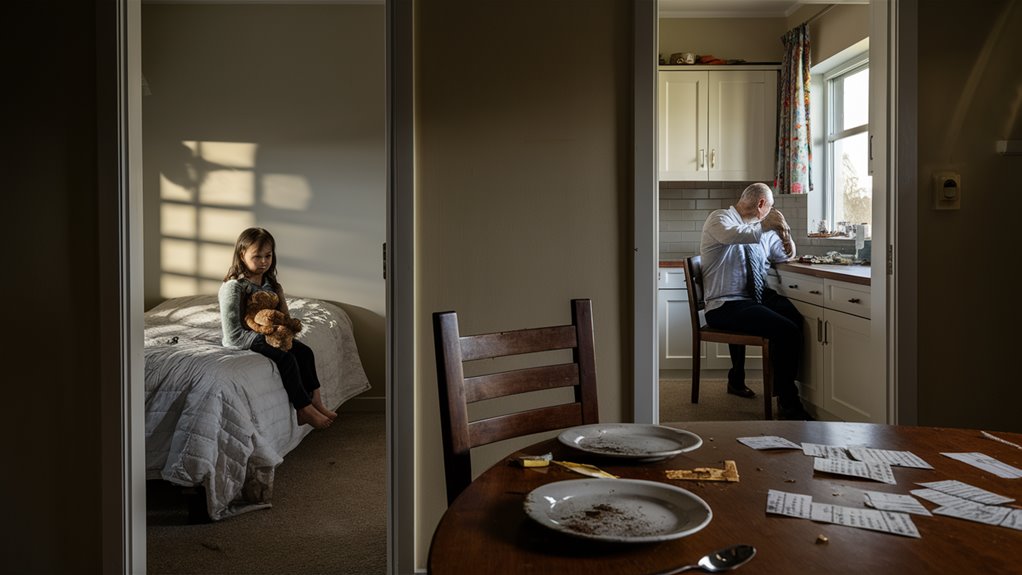The Impact of Gambling on Your Close Ties

Understanding the Harmful Loop
Problem gambling harms close ties through a cycle of lost trust, financial ruin, and emotional distancing. It often starts with unexplained absences, secretive financial behaviors, and mounting debts, leading to significant family issues.
Signs and Harm to Relationships
Indicators of deteriorating relationships include: 온카스터디
- Secretive financial behaviors and hidden purchases
- Withdrawal from family
- Irritability and defensiveness
- Neglecting partners and children
- Isolation from friends and support
- Increasing domestic tension
Effects on Family Members
Family members, particularly partners and children, often experience:
- Persistent stress and anxiety
- Financial instability
- Feelings of betrayal
- Erosion of trust and security
- Disrupted daily routine
- Diminished emotional connections
Steps to Fixing and Healing
Recovery involves:
- Professional help and communication
- Financial transparency
- Rebuilding trust over time
- Open dialogue
- Family counseling
- Accountability
- Participation in support groups
Repairing damaged ties requires genuine effort, expert guidance, and sustained open communication and trust-building.
The Loss of Trust
Understanding Trust Gone in Problem Gambling
Trust erosion is the initial casualty of gambling issues. It begins with minor deceptions, such as concealing small losses or misrepresenting time spent on gambling, which leads to larger secrets.
The resulting financial dishonesty manifests in hidden expenditures, fabricated explanations for broken promises, and unauthorized borrowing.
How It Hurts Family Life and Ties
The breakdown of interpersonal trust is not merely about dishonesty; it represents a deep violation of fundamental family values and responsibilities.
When compulsive gambling precedes family needs, depletes shared finances, and reneges on commitments to change, it conveys a detrimental message regarding priorities.
Impacts on Family and Financial Stability
The Effects of Money Problems on Family Life
Money Troubles from Gambling Issues
The financial turmoil caused by gambling creates a complex web that undermines family security.
Signs of a Family Financial Crisis
- Missed mortgage payments
- Drained savings
- Overdue credit card balances
- Unpaid bills
- Depleted emergency funds
Disruptions in Family Life and Long-Term Effects
The ongoing financial strain affects all aspects of home life. Children are particularly vulnerable, facing challenges such as:
- Withdrawal from extracurricular activities
- Reduced educational opportunities
- Limited social interactions
- Compromised nutrition and care
Less Money, More Stress
Financial insufficiency breeds considerable emotional distress at home:
- Persistent stress and anxiety
- Sleep disturbances
- Increased family conflicts
- Depression
- Deteriorated relationships
Recognizing that financial distress extends beyond monetary concerns is crucial as it profoundly impacts the emotional well-being and stability of all family members.
When Gambling Makes Us Drift Apart
Seeing the Emotional Gap in Gambling Issues
How Gambling Affects Emotional Closeness
Problem gambling creates a substantial emotional divide, erecting invisible barriers in once-intimate relationships.
This emotional gap manifests as gamblers prioritize gambling over meaningful connections with loved ones, even in their presence.
Signs of Emotional Drifting Caused by Gambling
Warning signs include:
- Missing important family events
- Reduced emotional intimacy
- Avoidance of deep conversations
- Preoccupation with gambling
Breaking Free of the Emotional Gap
The path gambling takes often makes a loop of:
- Feelings of shame and guilt
- Withdrawal from relationships
- Weakened family ties
- Increased isolation
Getting Better and Close Again
Finding a way back from gambling-generated emotional chasms requires recognition of the toll on relationships and a commitment to mending emotional bonds.
- Therapeutic interventions
- Adherence to recovery plans
- Acknowledgment of emotional harm
- Dedication to relationship restoration
Kids of Problem Gamblers
How Kids are Affected by Gambling Issues

Seeing How Kids Suffer from Gambling at Home
Children of problem gamblers face significant emotional and psychological challenges that can persist into adulthood.
Their developmental experiences are adversely affected by deprivation, inconsistent parenting, and financial instability, which erode their sense of security.
Many are forced to mature prematurely, forgoing typical childhood experiences while their own needs remain unmet.
Deep Issues for Kids
Parental gambling issues sow profound seeds of adversity for children, including:
- Feelings of abandonment
- Chronic anxiety
- Self-blame
- Mistrust
Long-Term Risks and Dangers
Studies indicate that children of gambling addicts are at increased risk of:
- Severe depression
- Substance abuse
- Developing gambling problems
- Struggling with relationship building
- Deep-seated emotional scars
Breaking the Cycle and Getting Better
Intervention strategies for affected families should incorporate:
- Professional counseling for parents and children
- Family therapy
- Support group participation
- Financial literacy education
- Trauma-informed care
Building a Better Path
Essential strategies for parental recovery and child well-being include:
- Open family communication
- Establishing daily routines
- Trust-building through consistent parenting
- Adaptive coping mechanisms
- Robust social support
This comprehensive approach addresses both immediate and long-term consequences of parental gambling on children’s development and emotional stability.
Signs to Watch in Relationships
Early Signs of Gambling Issues in Relationships
Identifying Gambling Issues Early
Recognizing early signs of gambling issues in relationships is crucial to preventing significant emotional and financial damage.
Early intervention safeguards both individuals and preserves the relationship.
Financial Warning Signs
Initial indicators include unusual financial behaviors such as:
- Disappearing funds from joint accounts
- Unfamiliar charges on credit cards
- Missing household items
- Frequent requests for loans
- Undisclosed debts or loans
Behavioral Changes
Observe these noticeable behavioral shifts:
- Erratic schedules and unexplained absences
- Secretive communication
- Irregular work hours
- Defensiveness about financial discussions
- Avoidance of family activities
Emotional Changes
Be aware of these significant emotional changes:
- Increased irritability and mood swings
- Withdrawal from social interactions
- Reduced interest in leisure activities
- Obsessive thoughts about gambling
- Emotional detachment from partner and family
Taking Steps
Trust your instincts when identifying these signs.
Document any suspicious financial activities and behavioral changes.
Seek professional guidance if you notice multiple signs.
Prompt intervention is critical for ensuring recovery and maintaining a healthy relationship.
Talking Through Difficult Conversations
Navigating Challenging Discussions with Problem Gamblers
Choosing the Right Time to Communicate
Selecting the optimal time and place for discussing gambling concerns is essential for effective communication.
Choose a calm, private setting when both parties are composed and clear-headed. This creates a safe space for open dialogues about challenging topics.
Effective Communication
Using “I” statements can facilitate smoother conversations:
- “I am concerned about our financial situation”
- “I notice unusual spending patterns”
- “I want to understand your experiences”
Managing Emotional Responses
Discussions about gambling issues may trigger defensiveness due to shame and addiction’s grip. Effective approaches include:
- Active listening without judgment
- Remaining composed despite denial
- Empathizing while expressing concerns
- Allowing space for processing emotions
Alternative Communication Methods
If face-to-face conversations are challenging, consider:
- Writing thoughtful letters about concerns
- Sending well-considered emails outlining observations
- Involving professionals to mediate discussions
Seeking Professional Guidance
Obtaining support from qualified professionals can enhance communication:
- Couples therapy for relationship issues
- Specialized gambling counselors for focused assistance
- Support groups for shared experiences
- Financial advisors for practical insights
Remember, navigating difficult conversations is a process requiring patience and frequent attempts.
Professional support provides tools for handling these tough discussions while supporting mutual recovery.
Steps to Recovery Together
Establishing a Foundation for Addressing Gambling Issues
Achieving success in gambling recovery requires a collaborative effort and commitment to improvement within a relationship.
Recovery encompasses more than abstaining from gambling; it involves rebuilding trust and fostering a healthy relational dynamic.
Professional Assistance and Goal Setting
Engaging with appropriate professional support is a vital initial step. Seek a counselor proficient in both gambling issues and couples therapy for guidance.
Develop clear recovery objectives together, such as:
- Regular therapy attendance
- Developing transparent financial strategies
- Implementing accountability measures
- Establishing recovery milestones
Maintaining Healthy Habits for Sustained Recovery
Successful recovery is contingent upon new daily habits that fortify the relationship while resisting gambling temptations.
Effective strategies include:
- Frequent check-ins to discuss emotions and concerns
- Participating in addiction support groups as a couple Flicker-Fast Blackjack: Accelerating Minor Dealer Tics for Splitting Velocity
- Mutual stress management
- Identifying and mitigating gambling triggers
Persevering in Recovery Efforts
Recognize that recovery is an enduring journey that may not follow a linear path. Focus on:
- Celebrating incremental successes
- Providing support during challenging times
- Sustaining open communication
- Exploring new experiences together
- Developing coping mechanisms for adversity
Setbacks may occur, yet remaining steadfast on the recovery journey is achievable through genuine support and continuous dialogue during mutual healing.
